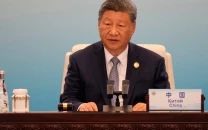Oman bans expatriate workers in nearly 90 different professions
The oil-dependent country seeks to establish more employment opportunities for its own citizens

The oil-dependent country seeks to establish more employment opportunities for its own citizens. PHOTO: AFP
According to Forbes Middle East, the regulation prohibits issuing work visas for expats in 10 sectors. These include information system, technical professions, airports, marketing, human resources, engineering, media, administration, and insurance and sales.
The oil-dependent country looks to establish more job opportunities for its own citizens to keep a control on unemployment.
“It is a way to make companies put in more effort to look for Omani professionals, as sometimes companies don’t do enough to look for Omanis," Chief Economist at Oman Investment Fund Fabio Scacciavillani told Times of Oman.
Oman oil and gas company to sign MoU with Pakistan soon
"This may be due to a bias they have for hiring expat workers,” he added.
Last week, Oman’s government announced its updated plan to release 25,000 jobs to Omanis within the next six months. The statement came after a demonstration by jobless workers at the ministry of manpower in Muscat.
A number of unemployed have gathered today, Monday 29 January 2018, in front of the ministry of manpower and its directorates in some cities (#Muscat, #Salalah and #Sur).#Omanis_seeking_for_job #عمانيون_بلا_وظائف6 https://t.co/ddw0H8kjct
— The Omani Centre for Human Rights & Democracy (@ochromanorg) January 29, 2018
In October last year, Oman’s council of ministers announced it planned to implement 25,000 jobs to Omanis in both the private and public sectors, starting December 2017.
In reference to the new policy, the council noted they were urging the private sector to comply with the “Omanisation” maximum priority policy.
The statement read, “There are actions to be taken against the establishments that do not cooperate with the efforts of the government to support employment and Omanisation policies.”
With additional info from Reuters



















COMMENTS
Comments are moderated and generally will be posted if they are on-topic and not abusive.
For more information, please see our Comments FAQ